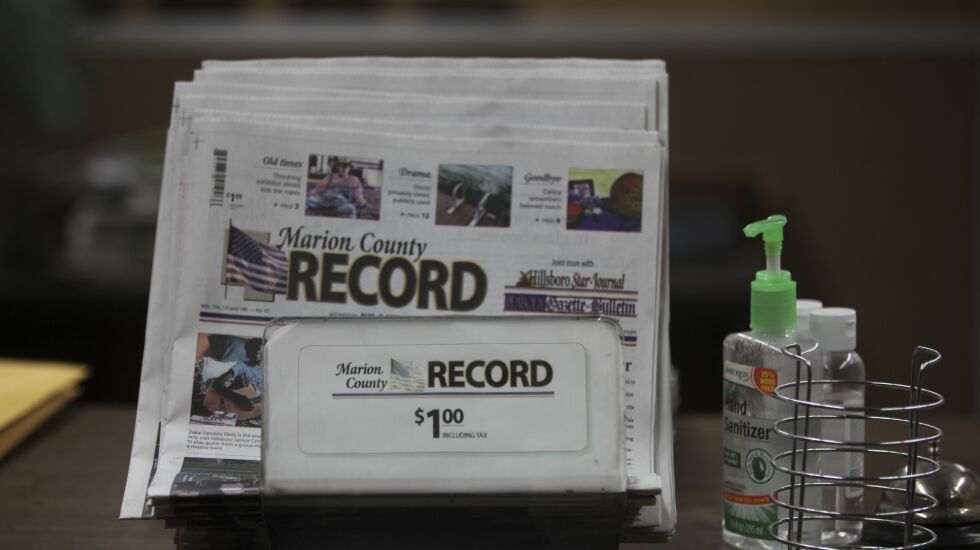
Late last month, Calumet City authorities hit Daily Southtown reporter Hank Sanders with a flurry of citations for asking too many questions.
The situation was so absurd it should’ve been comical, in a Reno 911! meets the First Amendment way. But the news was difficult to take lightly when it followed the arrests a week prior of an Alabama journalist and publisher for reporting on leaked grand jury documents.
Within a couple days, newspapers nationwide picked up the Associated Press report on the bogus tickets to Sanders. Days later, Calumet City dropped the case. It’s since been reported that Calumet City mayor Thaddeus Jones also sought an order barring Sanders from city hall.
As Illinois Press Association President Don Craven told the New York Times, “Newspapers have two ways of fighting back: One is litigation and the other is newsprint and ink. We have more of that than anybody else. We have to use it.”
Exactly. It’s no time for fence-sitting when a leading presidential candidate wants to investigate news outlets for treason and imprison reporters and a sitting U.S. senator is baselessly urging terrorism investigations of news outlets.
Fighting back with ink isn’t just about journalists. It’s about everyone who relies on a free press to stay informed.
And Calumet City’s retreat is far from the only recent proof that it works.
In January, Phoenix’s mayor apologized to Wall Street Journal reporter Dion Rabouin after footage of officers handcuffing him for conducting interviews drew national attention.
In February, Ohio Gov. Mike DeWine denounced NewsNation reporter Evan Lambert’s widely reported arrest for broadcasting during a press conference. Authorities dropped the charges.
In May, the Florida legislature shelved a bill to rewrite defamation law to help politicians and celebrities bleed journalists dry with legal fees. The bill’s passage seemed inevitable after Gov. Ron DeSantis, then near the peak of his political powers, cheered its provisions. But media backlash — especially from conservative outlets — stopped it in its tracks.
Perhaps most famously, the national outcry after the August police raid of the Marion County Record in Kansas led to the prompt dismissal of the illegal search warrant and eventually forced Police Chief Gideon Cody to send a resignation letter admitting he was “exhausted from the media pressure.” Mission accomplished.
Record publisher Eric Meyer’s 98-year-old mother, Joan, died the day after the raid, perhaps from stress. But she went out fighting. Eric says officers laughed off Joan’s warning that their antics would make international headlines. Now they’re the laughingstock.
But let’s compare those outcomes to incidents the national media didn’t spend ink on.
This June, North Carolina journalists Matilda Bliss and Veronica Coit were convicted of curfew violations for reporting for the Asheville Blade on cops evicting a homeless encampment at a public park. They’re appealing.
Arizona journalist Lucas Mullikin was forced to pay a fine and take a problematic “deferred prosecution” agreement in September after he, too, was arrested for recording police. Footage showed an officer violently throw Mullikin to the ground and then handcuff him after he demanded a badge number.
The FBI raided Florida journalist Tim Burke’s home in May over his obtaining Fox News outtakes that he says were publicly available online. Over 50 rights organizations asked the Department of Justice to clarify what he’s accused of doing wrong. The DOJ hasn’t responded.
Freedom of the Press Foundation’s U.S. Press Freedom Tracker is full of additional overlooked press freedom violations. Most have this in common: they involve independent journalists like Mullikin and Burke, or reporters from alternative outlets, like Bliss and Coit.
Unfortunately, the media has historically been far more likely to cover press freedom violations involving journalists with name recognition. But legal precedents don’t leave mainstream journalists unscathed, no matter where they arise. Craven’s call to fight back is about protecting press freedom, not just media insiders.
Standing up for journalists’ rights shouldn’t depend on their passing some ethical purity test. Some have questioned whether Alabama publisher Sherry Digmon should have served on the board of the school district a grand jury was investigating.
But that’s irrelevant to the grand jury secrecy charge, which doesn’t hinge on any conflicts (she’s separately accused of ethics violations for soliciting ads from the school). It alleges she “approved an article containing grand jury information and allowed the article to be printed.” Reporter Don Fletcher, who isn’t on the school board, is charged simply with writing the article.
Similarly, many have kept quiet about Julian Assange’s prosecution due to personal feelings about Assange. That overlooks the dangers of prosecuting a publisher for obtaining and publishing government secrets from sources, formerly known as investigative journalism.
Hopefully the national coverage in Kansas and Alabama is the start of a change.
Reporters who value their right to do their job need to speak up. There’s far more at stake than some silly citations in Calumet City.
Seth Stern is the director of advocacy for Freedom of the Press Foundation.
The Sun-Times welcomes letters to the editor and op-eds. See our guidelines.
The views and opinions expressed by contributors are their own and do not necessarily reflect those of the Chicago Sun-Times or any of its affiliates.







